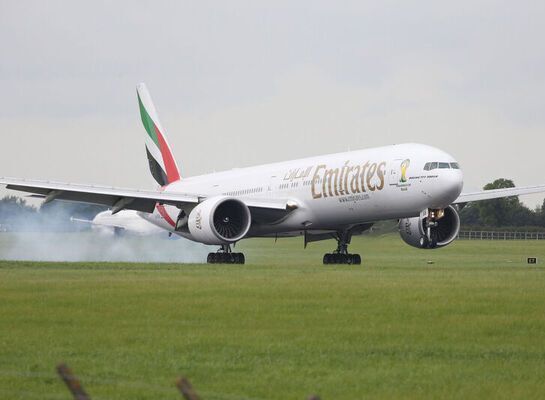Garda Philip O’Byrne, left, and Garda John Barrett being introduced by Professor Bettina Murray at the reception in their honor at John Jay College of Criminal Justice on March 16. The two men have just completed a 12-month stint studying at the college as recipients of the Detective Garda Jerry McCabe Scholarship.
PHOTO BY SARAH MORGANO
By Peter McDermott
In their 12 months in New York City, John Barrett and Philip O’Byrne have learnt a great deal. They’ve also had a few things confirmed for them, too.
One is that there’s a special bond between cops wherever they’re from.
Barrett and O’Byrne, who are members of An Garda Síochána, recalled sitting in on a briefing at the Department of Investigation at which there were about a dozen or more people in plain clothes.
“Once it was explained to them who we were, the NYPD guys came up to us afterwards and we had that bond straight away,” said Barrett, who is from County Mayo.
While people who work for the Department of Investigation are in the law enforcement community, there is a designated unit of the NYPD attached to the DoI because it has, for example, the power to arrest.
Blessington, Co. Wicklow native O’Byrne said: “Even though they’d just met us they could speak to us differently than with their colleagues in the DoI.”
Barrett added: “It’s like there’s a universal language of police.”
The two men are the latest to complete the scholarship that was established in the name of Detective Garda Jerry McCabe, 52, who was shot dead in an armed engagement with an IRA unit following a failed post-office robbery near Adare, Co. Limerick, on June 7, 1996.
“It caused reverberations around the whole country,” Barrett said.
U.S. Ambassador Jean Kennedy Smith was instrumental in its establishment, as was Dublin-born businessman Brean Murray. His widow, John Jay College Professor Bettina Murray, remains closely involved with the program.
One of McCabe’s sons was the first recipient 20 years ago, and he spent a semester in New York. It has since evolved to where the two gardaí spend August through August living in an apartment in Sunnyside, Queens, and studying for a post-graduate degree at John Jay College in Manhattan.
“Previous recipients have gained huge expertise and experience over here,” Barrett said, “and have thoroughly enriched An Garda Síochána since they got back. They brought some great ideas with them.”
Barrett and O’Byrne are the first recipients of the Detective Garda Jerry McCabe Scholarship since the late 1990s to study a Master’s in Public Administration rather than a degree in criminal justice.
The County Mayo native Barrett explained that it “concentrates on inspection and oversight which essentially is investigating abuse and corruption and promoting effectiveness economy efficiency in public agencies.”
He’d sought out an alumnus to learn more generally about John Jay College and the Jerry McCabe Fellowship. He came away from that meeting even more determined to apply.
“You would be gaining experience, gaining an incredible education in a prestigious college,” Barrett said.
He was impressed when he heard about the international connections he would make and with the involvement with the Irish Consulate in New York and other Irish organizations in the United States.
However, before he could apply, there were other factors to be considered.
“It’s a big change in your personal circumstances,” said Barrett, who is attached to the detective unit in Ballyfermot in Dublin.
“It involves analyzing those circumstances with your family and friends and your significant other.”
A person applying would have to consider also that if successful he or she would be working at Garda Headquarters in the Phoenix Park in Dublin for three years after returning from New York.
Barrett put all of this to his girlfriend Zara, who is a HR consultant for a bank in Dublin.
“Thankfully, she was very supportive,” he said. “She was very excited for me.
“I was very determined to get it then,” he added.
The decision was more complicated for O’Byrne, the father of three children, now 7, 5 and 2. He and his wife relocated in 2012 to her native Fuerty, Co. Roscommon, and he is attached to the station at Loughrea, Co. Galway, after previously being based in Dublin. But Martina O’Byrne was also very supportive of her husband’s desire to apply for the McCabe Scholarship in New York.
Another consideration for Barrett was his experience marching in the 2007 St. Patrick’s Day Parade. “That gave me an opportunity to see the esteem in which An Garda Síochána is held,” he said. “We were treated incredibly well by the organizers of the parade, by the NYPD and by the Irish societies.”
O’Byrne’s previous connection to the city was through a family tragedy, the death of his mother. Anne (nee Quigley) O’Byrne was visiting the city with his sister, his only sibling, when she suffered a brain hemorrhage. She died on Jan. 31, 2008, at St. Luke’s-Roosevelt, now Mount Sinai Hospital, which is across the street from John Jay College.
However, O’Byrne had little time to reflect on the personal side of his life once he arrived in New York in August 2016.
“You hit the ground running,” said his Garda colleague Barrett, who has an MA in criminology from Dublin Institute of Technology.
“A lot of our classmates were doing [the MPA] over 3 years, even 4 years. It’s intense, but manageable and enjoyable,” he said.
“It started on day one,” O’Byrne recalled, “It was fairly full on.”
O’Byrne obtained his primary degree in accountancy from the Institute of Technology, Tallaght in Dublin, while still living at home in Blessington. His late mother, who was a nurse, and his father William, a primary school teacher, had encouraged him to pursue his education as far he could. He went to Australia for a year, and when there, a competition for places in An Garda Síochána was announced back home. He’d been considering the police as a career option for some time, and so applied and was accepted.
Barrett is the 2nd of nine children of Michael, a farmer, and Philomena, who works in the Department of Social Welfare in Belmullet in the Mayo Gealtacht. The family lives just outside the village of Binghamstown. “It’s a very close-knit, tight community,” he said. “Everybody knows everyone else. It’s very scenic. It’s part of the Wild Atlantic Way.”
He believes he can pinpoint the precise moment when he got the idea that he wanted to be a police officer. It happened on the day a Garda came to his class to talk about road safety and personal safety generally.
“Even though I was only young at the time, 8 or 9, it struck me how professional he was,” Barrett said, remembering, too, “the air of authority, how kind he was to all the children.”
Barrett was accepted into the force at 19. “It’s lived up to all my expectations,” he said.
A year in New York is obviously a career highlight for both men, but also an opportunity, too, to give back as well as to honor a member of the force from County Kerry who, as they put it simply, “died in the line of duty.”
“We’ve had the opportunity to work with the Association of Inspector Generals, specifically Prof. Phil Zisman,” Barrett said.
A former Inspector General of the City of Yonkers for 12 years, Zisman, the association’s executive director and a John Jay professor, organized for the two Irish policemen to be qualified as inspector-general investigators in Jacksonville, Fla., in March.
Warren “Ned” Benton, professor and chair of the Department of Public Management at John Jay College, was another important person for the two men.
“Ned Benton was a guiding light for us. He was a huge influence on us,” Barrett said.
O’Byrne added: “He’s looked after us since the day we landed.”
“We’ve met people ordinarily we would never have met,” Barrett said about weekly trips led by Benton to West Point during spring semester. “It’s beyond our wildest thoughts and dreams.
There were several other standout moments: visiting the FBI’s New York City field office was one; seeing a film about and meeting with former NYPD Bomb Squad Detective Denis Mulcahy, the founder of Project Children,
“He’s a very humble man,” O’Byrne said of Mulcahy.
In their discussions with New York officers, they found one important difference in their respective cultures.
“An Garda Síochána is very integrated into its local communities,” Barrett said. “The NYPD has the same objectives, but is not as integrated into the community.”
He pointed to the example of the vast network of Gaelic Athletic Association clubs, which in most cases have police officers involved as players and trainers.
“As a result that creates a great bond with the community,” he said.
The college that has awarded them an MPA, though, is also a model to emulate.
“John Jay has great emphasis on diversity and as a result it holds its international students in high esteem,” Barrett said. “One of the great things about John Jay was meeting people from such diverse backgrounds, from the poorest countries in the world to the richest.”
The diversity reflected in class tended to be in a New York context, whereas the opportunity to meet with fellow international students came at the regular functions they attended.
One such function was held in their honor on March 16. It was attended by visiting Irish Minister of State Joe McHugh, several prominent members of the New York Irish community, and prominent academics. Barrett’s girlfriend Zara flew in from Dublin for the event.
At that March 16 reception, police officers from Burkina Faso in West Africa and China were among those who spoke up from the audience.
“We could email or pick up the phone tomorrow,” said Barrett, “It could be to Australia, Africa or any part of America. It’s making the world smaller.
“It’s making An Garda Síochána worldwide,” he said.









